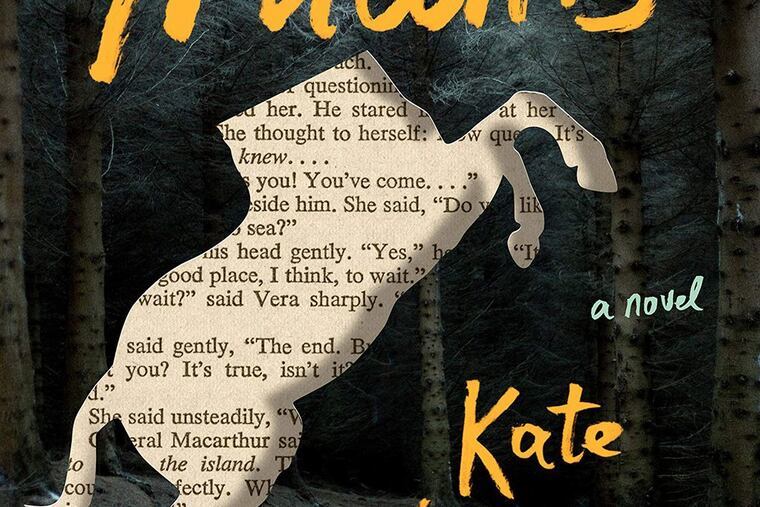‘The Truants’: A teacher, her pupil, and Agatha Christie | Book review
Kate Weinberg’s sizzling debut novel revolves around a fictional book also called “The Truants,” and it opens with a fan letter to its author sent by the narrator.

The Truants
By Kate Weinberg
Putnam. 320 pp. $26
Reviewed by Marion Winik
Kate Weinberg’s sizzling debut novel The Truants revolves around a fictional book also called The Truants, and it opens with a fan letter to its author sent by the narrator. As she explains in her mash note, Jessica Walker will be attending college at the University of East Anglia — a brutalist backwater in the middle of nowhere — mainly for the opportunity to escape the crushing banality of teenage life by studying with her idol.
“Since I first read your masterpiece The Truants, I have considered your scorching and irreverent commentary as something of a manifesto for life. … I have completed the reading list, including a full immersion in the gin-soaked minds of Hunter S. Thompson, Zelda Fitzgerald, and John Cheever.”
Though Lorna Clay’s academic star is seemingly on the rise, she has left a job at Cambridge for this much less prestigious school; the circumstances of her departure are a mystery. In any case, her drunk-authors class is full, so Lorna admits Jess into her Agatha Christie seminar. At first disappointed, Jess soon sees that the woman’s brilliance is just as blinding in what she thought to be a lesser context.
But as the librarian points out when Jess goes to check out the assigned Christie reading, “Crime doesn’t have its own section. … It’s all in Fiction.”
Professor Clay’s first lecture focuses not on the novels but on the life — Agatha Christie’s 11-day disappearance after she found out her husband was having an affair with her best friend. It sparked an intense nationwide hunt, at the end of which, she turned up at a spa hotel.
As the professor writes on the board: “People disappear when they most want to be seen.” This narrative of betrayal and disappearance echoes through the plot of The Truants. Though there’s no full-on murder mystery, the literary conversation with Dame Agatha continues with a couple of dead bodies, the possibility of foul play, and a visit to a remote Italian island.
Intrigue on campus is a juicy fictional genre of its own, suggesting another reading list: Donna Tartt’s classic The Secret History, and two recent excellent additions, If We Were Villains, by M.L. Rio, and My Education by Susan Choi. A crush on a charismatic teacher, platonic and otherwise, is a key component of these narratives; Lorna is a rock-star prof par excellence. With her striking pale orange hair and fair, freckled skin, her long skirts over scuffed cowboy boots, she possesses “the rarest type of beauty, the kind that isn’t strained for.” And though she has a live-in relationship with an older male faculty member, Lorna can be found holding court at student parties, where Jess observes that “some kind of current transmitted from her — not just from her blazing mind and the words that she chose, but from the very energy around her.”
Other regular features of the campus confidential are a best friend character and a complicated love interest, preferably a triangle. Jess finds the first down the hall of the dormitory: Georgie Duncan, a posh party girl with “bleached hair cropped high to the hairline on her long, fine neck” and “her pockets always spilling over with drugs.” Moments into the term, Georgie hooks up with Alec, a sexy South African journalist with a dangerous political past. Though Jess entertains the attentions of a kind, handsome geology student named Nick, she’s secretly mad for Alec. And everybody’s crazy about Lorna — or almost everybody.
Betrayals and disappearances ensue. The Truants gets a little plotty toward the end when it goes to Lorna’s island hideaway to solve its mysteries. Underlying the action, however, is the novel’s relationship to its namesake, Lorna’s “scorching and irreverent” literary manifesto. Must writers be “blind drunk, very high, or having sex with anyone they could get their hands on — living life dangerously and selfishly” to accomplish great things? Is the collateral damage — “from heartbroken partners to neglected children, even bloody corpses” — worth the price?
An actual bloody corpse can change your thinking on this, it seems. After Jess gets all the drama she could ever hope for during her first year in East Anglia, she is unexpectedly relieved when life becomes ordinary again.
We never learn what grade Jess got in Lorna’s seminar, but Kate Weinberg gets an A.
From Newsday.